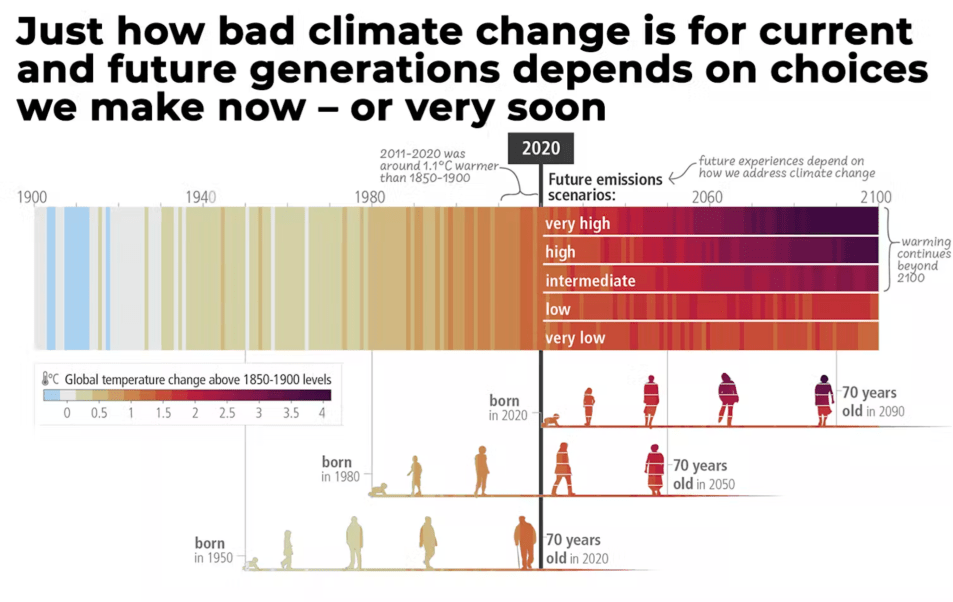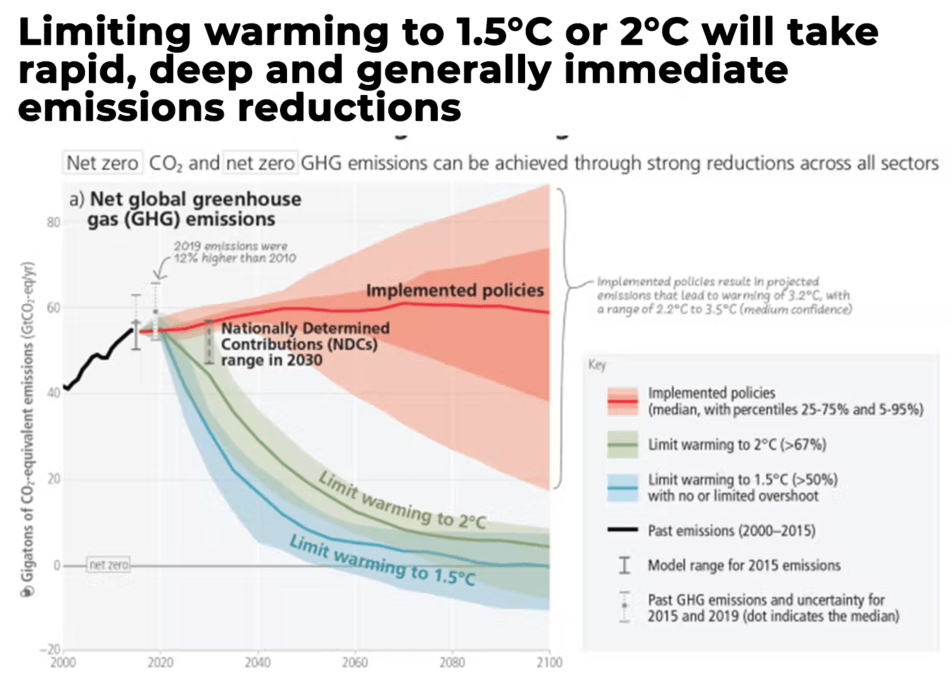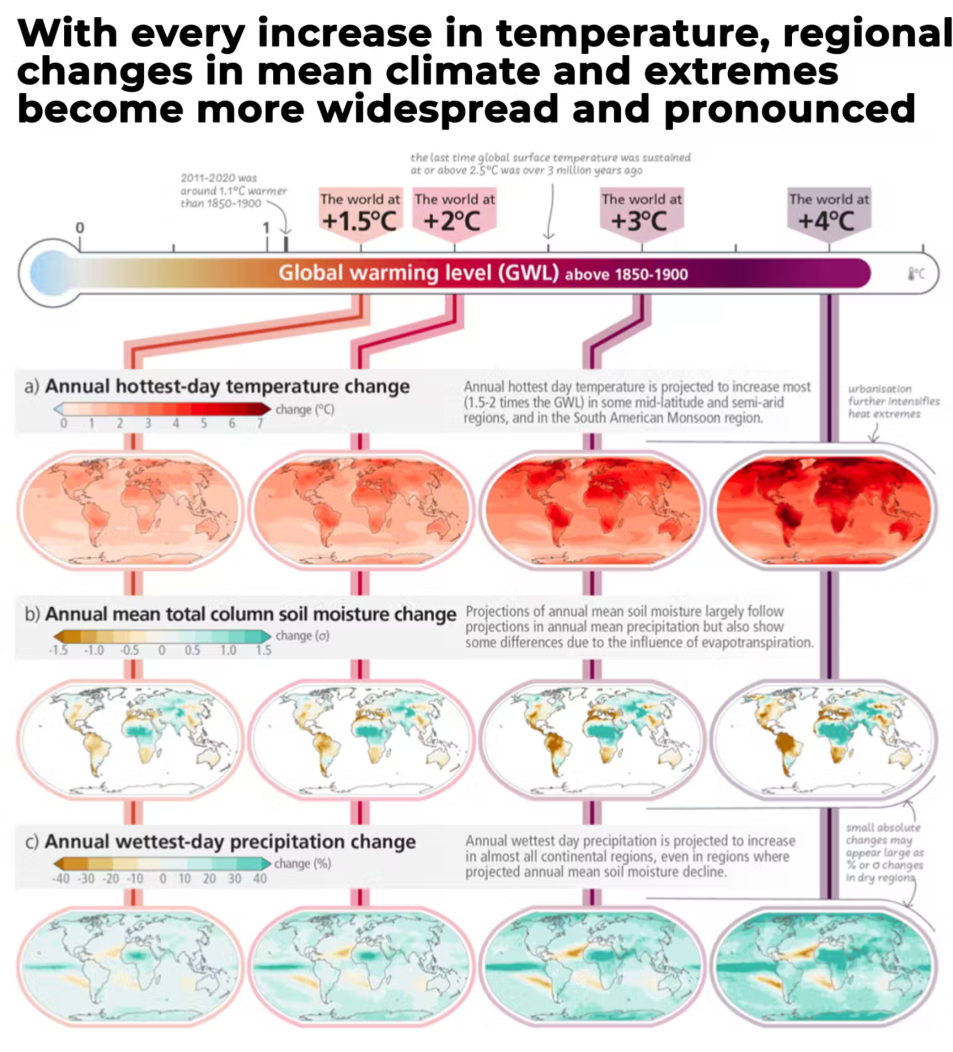
The world is in deep trouble on climate change, but if we really put our shoulder to the wheel we can turn things around. Loosely, that’s the essence of today’s report by the Intergovernmental Panel on Climate Change (IPCC).
The IPCC is the world’s official body for assessment of climate change. The panel has just released its Synthesis Report, capping off seven years of in-depth assessments on various topics.
The report draws out the key insights from six previous reports, written by hundreds of expert authors. They spanned many thousands of pages and were informed by hundreds of thousands of comments by governments and the scientific community.
The Synthesis Report confirms humans are unequivocally increasing greenhouse gas emissions to record levels. Global temperatures are now 1.1℃ above pre-industrial levels. They’re likely to reach 1.5℃ above pre-industrial levels in the early 2030s.

This warming has driven widespread and rapid global changes, including sea level rise and climate extremes — resulting in widespread harm to lives, livelihoods and natural systems.
It’s increasingly clear that vulnerable people in developing countries — who have generally contributed little to greenhouse gas emissions — are often disproportionately affected by climate change.
Intergenerational inequities are also likely. A child born now is likely to suffer, on average, several times as many climate extreme events in their lifetime as their grandparents did.
The world is up the proverbial creek — but we still have a paddle. Climate change is worsening, but we have the means to act.
So much at stake
Over the past week in Interlaken, Switzerland, several hundred representatives from most of the world’s governments scrutinised the IPCC report’s 35-page summary. The scrutiny happens sentence by sentence, often word by word, and number by number. Sometimes it’s subject to intense debate.
We were both involved in this process. The role of the reports’ authors and IPCC bureau members is to stay true to the underlying science and chart a way between different governments’ preferences. It is a unique process for scientific documents.
The approval process usually goes right to the wire, in meetings running through the night. This Synthesis Report was no exception. The scheduled time for the meeting was extended by two days and nights, wearing down government representatives and the IPCC teams.
The process reflects how much is at stake. The IPCC’s assessments are formally adopted by all governments of the world. That in turn reverberates in the private sector — for example, in the decisions of boards of major companies and investment funds.
The latest on greenhouse gas emissions
The Synthesis Report confirms both emissions and atmospheric concentrations of greenhouse gases are now at record highs.
To keep warming within 2℃ above pre-industrial levels, global greenhouse gas emissions must decline by around 21% by 2030 and around 35% by 2035. Keeping warming below 1.5℃ requires even stronger emissions reduction.
This is a very tall order in light of emissions trajectories to date. Annual global emissions in 2019 were 12% higher than in 2010, and 54% higher than in 1990.

But success in reducing emissions has been demonstrated. The IPCC says existing policies, laws, technologies and measures the world over are already reducing emissions by several billion tonnes of carbon dioxide and other greenhouse gases, compared to what would otherwise be the case.
Most importantly, it’s clear global emissions could be reduced deeply if existing policy instruments were scaled up and applied broadly. The report shows large potential for emissions-reduction options across all parts of the world economy.
Many of these come at low cost. And many bring side benefits, such as reduced air pollution. If all technically available options were used, global emissions could be at least halved by 2030, at manageable costs.
As today’s report states, the global economic benefit of limiting warming to 2℃ exceeds the costs of emissions reduction. That’s without even taking into account the avoided damages of climate change or the side benefits that sensible action could generate.
We have the collective experience to turn the corner. As the report spells out, a great many regulatory and economic policy instruments have been used successfully. And we know how to design climate policies to make sure they’re politically acceptable and do not disadvantage the poorer parts of society.
The report also draws out the importance of good institutions for climate change governance — such as laws and independent bodies — and for all groups in society to be meaningfully involved.
Adaptation falls short
Rapid action on climate change is the economically sensible thing to do. If we fail to rein in emissions, adapting to the damage it causes will be more difficult and expensive in future. What’s more, our existing adaptation options will become less effective.
Every increment of warming will intensify climate-related hazards such as floods, droughts, heatwaves, fires and cyclones. Often, two or more hazards will occur at the same time.
Unfortunately, overall global adaptation has not kept up with the pace and degree of increasing impacts from climate change. Most responses have been fragmented, incremental and confined to a specific sector of the economy. And most are unequally distributed across regions and vary in their effectiveness.
The barriers to more effective adaptation responses are well known. Chief among them is a widening gap between costs of adaptation and allocated finance. We can, and should, do a lot better.

As today’s IPCC report confirms, there are ways to make adaptation more effective. More investment in research and development is needed. So too is a focus on long-term planning as well as inclusive, equitable approaches that bring together diverse knowledge.
Many adaptation options bring significant side benefits. Better home insulation, for instance, can help us deal with extreme weather as well as reduce heating and cooling costs and related greenhouse gas emissions.
Moving people off flood-prone areas and returning these areas to more natural systems can reduce flood risk, increase biodiversity and store carbon dioxide in plants and soil.
And climate adaptation policies that prioritise social justice, equity and a “just transition” can also help achieve other global ambitions, such as the United Nations Sustainable Development Goals.
This article was republished via The Conversation.










Meanwhile, on ABC RN Breakfast in the last few days, the presenter along with various media commentators such as Michelle Grattan, federal senators and ministers were all in full agreement that the Greens’ attempt to take account of the IPCC’s advice is ‘hardline’, ‘extremist’ and ‘irresponsible’.
The world turned upside down…
abc news and current affairs is often just a more cultured verson of sky after dark these days. A stream of vested interest representatives lying without consequence or challenge. I can rarely listen.
The Green’s climate policies, which, unlike the government’s, accord with the science, are ‘irresponsible’ according to the Labor government and its uncritical followers in the media and true-believer circles. How so? Because the government is beholden to the interests of capital and the fossil fuel industry. According to the government’s policies, permitting new fossil fuel projects won’t increase carbon emissions. They must have a magic wand hidden somewhere.
I don’t know how many times I’ve texted, “BRING BACK THE CARBON TAX!” to RN Breakfast. P Karvelas has never read it out.
Since the noughties media and parties inc. LNP, confused conservatives in Labor and Greens, were led to believe that ‘immigration’ &/or population growth are the environmental (imported) hygiene issues and costs to the nation
The latter was opposed to actual grounded policies to transition away from carbon and adopt robust sensible regulation; form of imported greenwashing and populism emerged in the noughties as a foil to (deflect from) fossil fuels and carbon pricing with whiffs of white Australia and eugenics.
Two decades wasted allowing maintenance of fossil fuel income streams and value, coinciding with dominance of oldies and baby boomer bubble (& hip pockets) in elections; Goodfellow in Green Agenda article ‘Green Anti-Immigration Arguments Are A Cover For Right Wing Populism’ (22 Feb ’19) wrote:
‘The environmental rhetoric of the population debate might be alluring to progressives. Who would argue against clean air and clean water? Who wouldn’t agree that the current paradigm of growth is unsustainable? The problem is that an analysis based solely in population is superficial, creating solutions that end up marrying with the worst parts of Australian politics – far-right populism.’
https://greenagenda.org.au/2019/02/right-wing-populism-cover/
Since the noughties media and parties inc. LNP, confused conservatives in Labor and Greens, were led to believe that ‘immigration’ &/or population growth are the environmental (imported) hygiene issues and costs to the nation
The latter was opposed to actual grounded policies to transition away from carbon and adopt robust sensible regulation; form of imported greenwashing and populism emerged in the noughties as a foil to (deflect from) fossil fuels and carbon pricing with whiffs of white Australia and eugenics.
Two decades wasted allowing maintenance of fossil fuel income streams and value, coinciding with dominance of oldies and baby boomer bubble (& hip pockets) in elections.
Since the noughties media and parties inc. LNP, confused conservatives in Labor and Greens, were led to believe that ‘immigration’ &/or population growth were and are the environmental (imported) hygiene issues and costs to the nation, of our time.
The latter was opposed to actual grounded policies to transition away from carbon and adopt robust sensible regulation; form of imported greenwashing and populism emerged in the noughties as a foil to (deflect from) fossil fuels and carbon pricing with whiffs of white Australia and eug*n*cs.
I have no faith in humanity to respond to this warning with anything resembling the necessary response.
I agree.
Of all the living creatures on the planet surely none are as stupid as humans.
But “the people” are not in charge. Our biggest problem are the ruling classes, which by definition are the classes that rule. Observe the ease with which the Western global order was able to command extraordinary support for its leisurely provocation of an avoidable war.
Any government that does try to force action will be overthrown by the CIA; look how easily it (or Britain, another AUKUS chum) got away with blowing up the the Nordstream pipelines to their Western European “allies”, thus diverting that market to much more expensive American LNG.
Social justice? Women’s rights?
Victory by the People’s Democratic Party of Afghanistan (PDPA, the Afghan COMMUNIST PARTY) in 1978 led to the abolition of feudalism, freedom for all religions, equal rights for women, social justice for the ethnic minorities, free medical care for the poorest, and a mass literacy programme. But the United States then and now hates social let alone socialist progress. So it ensured an extremely violent mujahideen (later the Taliban) takeover. So now, four decades after the U.S. did the opposite, women/social justice writers still pretend that the U.S. would tolerate any such thing in Afghanistan, or any other country. Only while there’s no risk of it. How are abortion rights in the U.S. again? Remind us.
Same regarding global heating.
After the invasion Shrub refused to allow any input from the AWA (Afghan Women’s Association) into the ‘peace’ because “them’s kommies!“
“It can be done. It must be done!” It won’t be done. Politics in Australia is the art of burying your head in the sand for three years, and hoping that it either all goes away, or that the opposition inherit the problem, and you can then bash them for trying to do something relevant.
BRACE-as they say in the news biz-for Bowen to STARE DOWN the report As the late Peter Smark observed about the NSW Right Any talf of redistribution or social justice is met with looks of genuine incredulity To this list add action about climate change
As in all things management a lot depends on whose bucket on money the costs come from and whose bucket of money the benefits go to. In the case of climate change the benefits accrue to the fossil fuel people and the costs come from the victims which are everybody else. A lot of the costs will come from public money but a lot will be borne by individuals , mostly people who cant afford it. But the fossil fuel people will be fine.
The answer might be to start allocating some costs to the fossil fuel people.
As if.